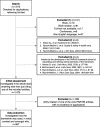The use of the PARIHS framework in implementation research and practice-a citation analysis of the literature
- PMID: 32854718
- PMCID: PMC7450685
- DOI: 10.1186/s13012-020-01003-0
The use of the PARIHS framework in implementation research and practice-a citation analysis of the literature
Abstract
Background: The Promoting Action on Research Implementation in Health Services (PARIHS) framework was developed two decades ago and conceptualizes successful implementation (SI) as a function (f) of the evidence (E) nature and type, context (C) quality, and the facilitation (F), [SI = f (E,C,F)]. Despite a growing number of citations of theoretical frameworks including PARIHS, details of how theoretical frameworks are used remains largely unknown. This review aimed to enhance the understanding of the breadth and depth of the use of the PARIHS framework.
Methods: This citation analysis commenced from four core articles representing the key stages of the framework's development. The citation search was performed in Web of Science and Scopus. After exclusion, we undertook an initial assessment aimed to identify articles using PARIHS and not only referencing any of the core articles. To assess this, all articles were read in full. Further data extraction included capturing information about where (country/countries and setting/s) PARIHS had been used, as well as categorizing how the framework was applied. Also, strengths and weaknesses, as well as efforts to validate the framework, were explored in detail.
Results: The citation search yielded 1613 articles. After applying exclusion criteria, 1475 articles were read in full, and the initial assessment yielded a total of 367 articles reported to have used the PARIHS framework. These articles were included for data extraction. The framework had been used in a variety of settings and in both high-, middle-, and low-income countries. With regard to types of use, 32% used PARIHS in planning and delivering an intervention, 50% in data analysis, 55% in the evaluation of study findings, and/or 37% in any other way. Further analysis showed that its actual application was frequently partial and generally not well elaborated.
Conclusions: In line with previous citation analysis of the use of theoretical frameworks in implementation science, we also found a rather superficial description of the use of PARIHS. Thus, we propose the development and adoption of reporting guidelines on how framework(s) are used in implementation studies, with the expectation that this will enhance the maturity of implementation science.
Keywords: Citation analysis; Implementation science; Knowledge translation; PARIHS framework.
Conflict of interest statement
We acknowledge that GH, AK, and JRM were all involved in the development of the PARIHS framework. Further, IDG, JRM, and LW are all members of the BMC Implementation Science Editorial Board.
Figures
Similar articles
-
Conceptual and relational advances of the PARIHS and i-PARIHS frameworks over the last decade: a critical interpretive synthesis.Implement Sci. 2022 Dec 7;17(1):78. doi: 10.1186/s13012-022-01254-z. Implement Sci. 2022. PMID: 36476376 Free PMC article. Review.
-
Combined use of the integrated-Promoting Action on Research Implementation in Health Services (i-PARIHS) framework with other implementation frameworks: a systematic review.Implement Sci Commun. 2025 Mar 6;6(1):25. doi: 10.1186/s43058-025-00704-1. Implement Sci Commun. 2025. PMID: 40051001 Free PMC article. Review.
-
A critical synthesis of literature on the promoting action on research implementation in health services (PARIHS) framework.Implement Sci. 2010 Oct 25;5:82. doi: 10.1186/1748-5908-5-82. Implement Sci. 2010. PMID: 20973988 Free PMC article.
-
Mobilising Implementation of i-PARIHS (Mi-PARIHS): development of a facilitation planning tool to accompany the Integrated Promoting Action on Research Implementation in Health Services framework.Implement Sci Commun. 2023 Jan 9;4(1):2. doi: 10.1186/s43058-022-00379-y. Implement Sci Commun. 2023. PMID: 36624543 Free PMC article.
-
The utility of the implementation science framework "Integrated Promoting Action on Research Implementation in Health Services" (i-PARIHS) and the facilitator role for introducing patient-reported outcome measures (PROMs) in a medical oncology outpatient department.Qual Life Res. 2021 Nov;30(11):3063-3071. doi: 10.1007/s11136-020-02669-1. Epub 2020 Oct 21. Qual Life Res. 2021. PMID: 33089474 Free PMC article.
Cited by
-
Improving the Physical Health of Psychiatric Hospital Residents: An Evaluation of an Obesity Education Program for Mental Health Professionals.Healthcare (Basel). 2022 Sep 23;10(10):1851. doi: 10.3390/healthcare10101851. Healthcare (Basel). 2022. PMID: 36292296 Free PMC article.
-
Feasibility and acceptability of a novel biomedical device to prevent neonatal hypothermia and augment Kangaroo Mother Care in Kenya: Qualitative analysis of focus group discussions and key Informant Interviews.PLOS Glob Public Health. 2024 Apr 16;4(4):e0001708. doi: 10.1371/journal.pgph.0001708. eCollection 2024. PLOS Glob Public Health. 2024. PMID: 38626201 Free PMC article.
-
Comprehensive adolescent healthcare transition program for congenital adrenal hyperplasia: A quality improvement initiative.Health Care Transit. 2024 Mar 21;2:100057. doi: 10.1016/j.hctj.2024.100057. eCollection 2024. Health Care Transit. 2024. PMID: 39712594 Free PMC article.
-
Universal Mindfulness Training in Schools for Adolescents: a Scoping Review and Conceptual Model of Moderators, Mediators, and Implementation Factors.Prev Sci. 2022 Aug;23(6):934-953. doi: 10.1007/s11121-022-01361-9. Epub 2022 Mar 10. Prev Sci. 2022. PMID: 35267177 Free PMC article.
-
Acceptance and implementation of evidence-based practices in delivery room resuscitation: A qualitative study.SSM Qual Res Health. 2025 Jun;7:100557. doi: 10.1016/j.ssmqr.2025.100557. Epub 2025 Apr 1. SSM Qual Res Health. 2025. PMID: 40718678 Free PMC article.




